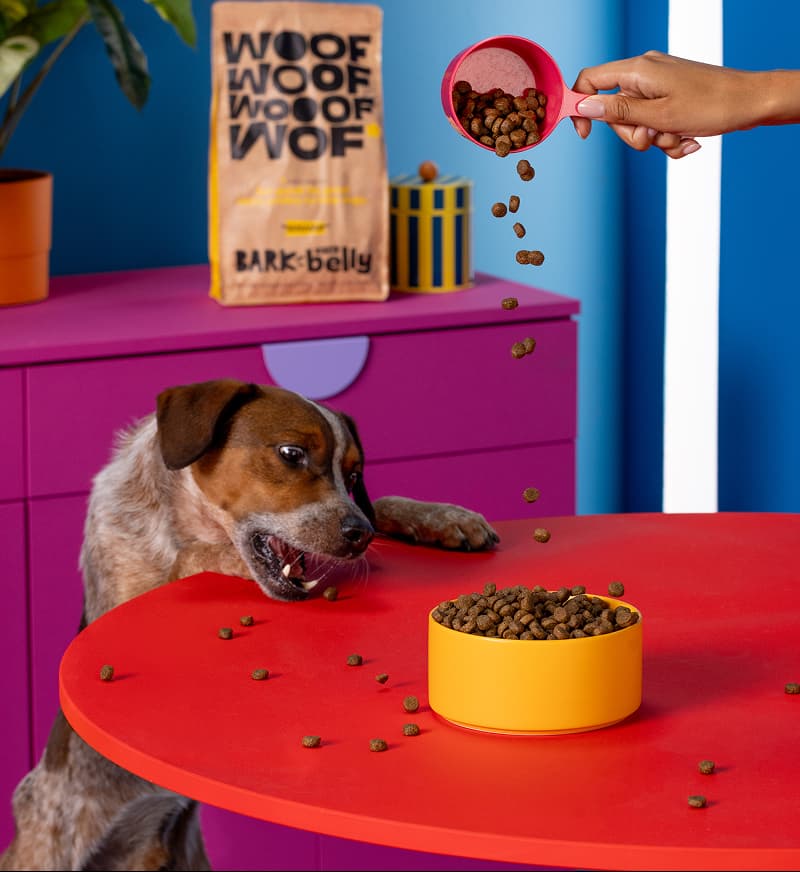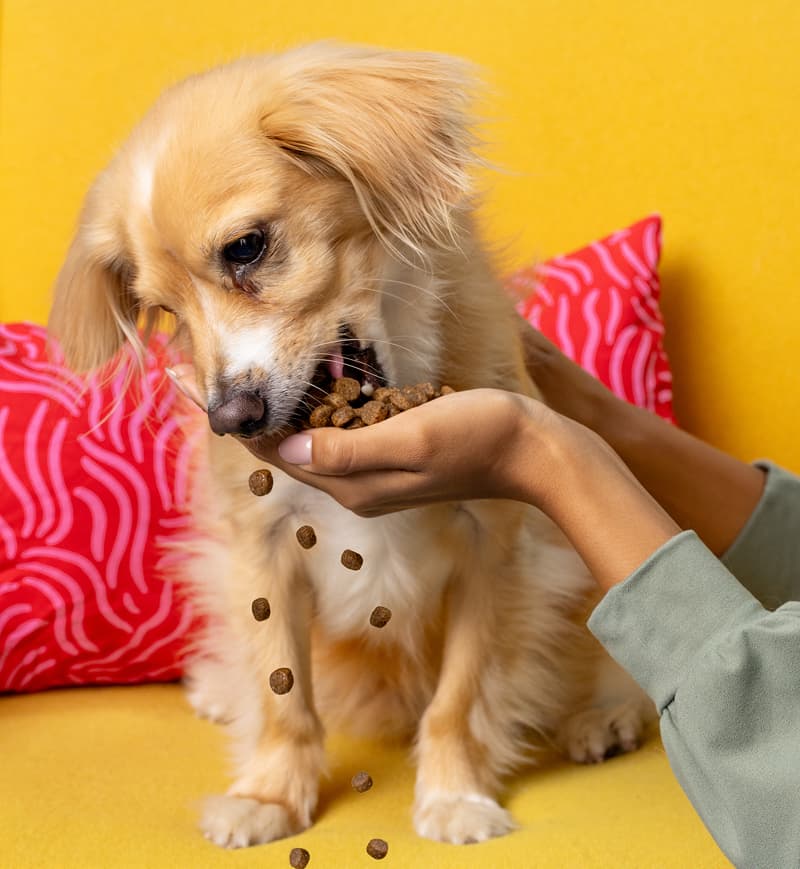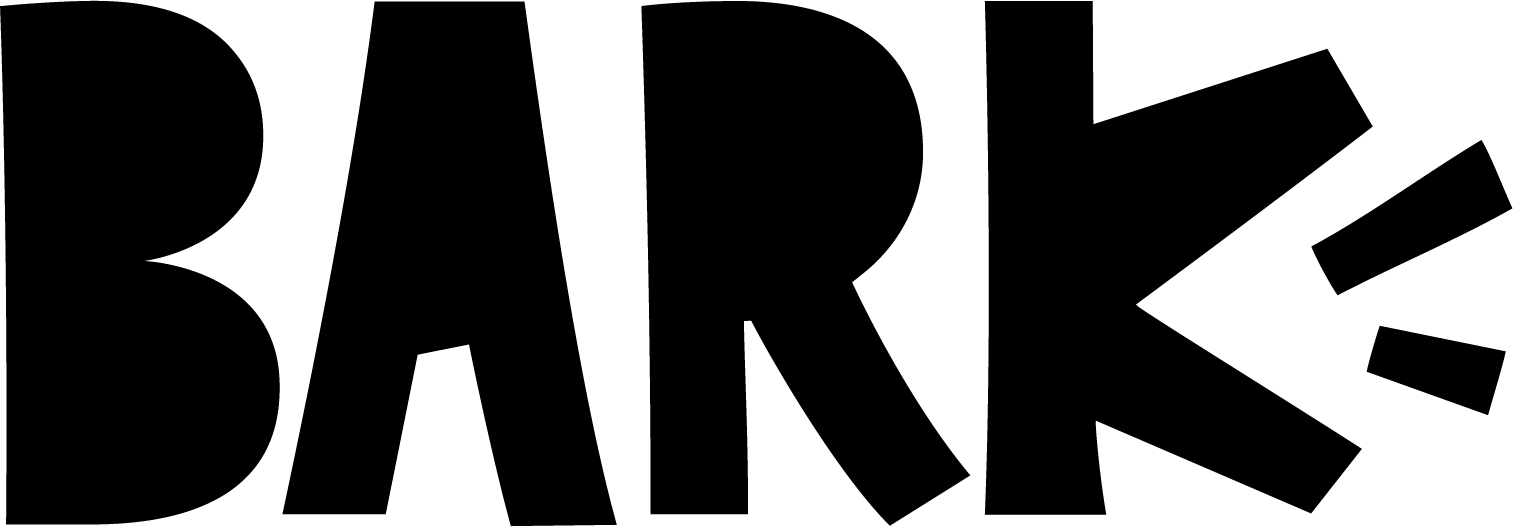Farm-Raised ChickenPeasBarleySorghumCarrots
Nutrition Facts
Protein
Real Chicken is the #1 Ingredient
Because dogs don’t dream about “chicken flavor.” They dream about chicken. Period.
Supplements
Immune System Sidekick
Packed with antioxidants like Vitamin E, Selenium, and Zinc to help dogs fight off villains like germs, squirrels, and the vacuum.
Belly Buddies
Pre- and Probiotics for happy digestion.
Hip & Joint Helpers
Hip + joint helpers (like glucosamine) for epic zoomies.
Skin & Coat Support
Omegas 3 & 6 for a coat that says “pet me, I’m stunning”.
Full Ingredient List
Chicken, Chicken Meal, Sorghum, Barley, Pea Protein, Chicken Fat (preserved with Mixed Tocopherols and Citric Acid), Brown Rice, Beet Pulp, Brewers Dried Yeast, Soybean Meal, Corn Germ Meal, Peas, Poultry Liver Flavor, Carrot Powder, Potassium Chloride, Chicken By-Products, Salmon Oil, Inulin, Choline Chloride, Salt, alpha Tocopherol Acetate, Taurine, Zinc Sulfate, Calcium Carbonate, Iron Sulfate, Pea Fiber, Citric Acid (preservative), Mixed Tocopherols (preservative), Niacinamide, L-Carnitine, Copper Sulfate, Manganese Sulfate, Vitamin B12 Supplement, Vitamin A Supplement, Calcium Pantothenate, Zinc Proteinate, Sodium Selenite, Riboflavin, Pyridoxine Hydrochloride, Thiamin Mononitrate, Copper Proteinate, Manganese Proteinate, Calcium Iodate, Vitamin D3 Supplement, Biotin, Folic Acid, Natural Flavors, Dried Enterococcus faecium Fermentation Product, Dried Lactobacillus acidophilus Fermentation Product, Dried Lactobacillus casei Fermentation Product.
Note: All food recipes contain some chicken, and will not be suitable for dogs with a chicken allergy.
Guaranteed Analysis
Crude Protein (min): 27.0%
Crude Fat (min): 13.0%
Crude Fiber (max): 3.5%
Moisture (max): 10.0%
Zinc (max): 150 mg/kg
Selenium (min): 0.35 mg/kg
Vitamin E (min): 450 IU/kg
L-Carnitine* (min): 50 mg/kg
Glucosamine* (min): 500 ppm
Omega-6 Fatty Acid* (min): 2.5%
Omega-3 Fatty Acid* (min): 0.3%
Taurine* (min): 0.2%
Total Microorganisms: Bacteria (min)
(Lactobacillus Acidophilus, Enterococcus
Faecium, Lactobacillus Casei)*: 1M cfu/lb
* Not recognized as an essential nutrient by the AAFCO Dog Food Nutrient Profiles.
Our Approach
Bark Chicken and Ancient Grains Recipe dog food is formulated to meet the nutritional levels established by the Association of American Feed Control Officials (AAFCO) Dog Food Nutrient Profiles for all life stages including growth of large size dogs (70 lb. or more as an adult).
50% Off Your First Bag When You Subscribe | Use Code BELLY50









NEW FLAVORS
Chicken & Ancient Grains Recipe
We pledge to not take 1 cent of profit until there are no hungry dogs.
Available only with a BarkBox or Super Chewer subscription. Purchase after subscribing.
Meal plan calculator
Tell us about your dog
We'll use your dog's age and weight to build a perfect plan to deliver the freshest, healthiest, premium food to your door.
Pounds
Months
Our Recommendation
Here's how much premium food we think should be in your dog's belly based on their weight and age.

Chicken & Ancient Grains Recipe
every weeks
This product is only available to eligible subscribers.
100% Happy
Guarantee
Made
In
The
USA
with
the
world's
finest
ingredients

Available only with a BarkBox or Super Chewer subscription. Purchase after subscribing.
Pre & Probiotics
Immune System Support
Omega-3s & Omega-6s
Made in the USA
Zero Profit
Vet Approved
Whole Ingredients
No Filler
Pre & Probiotics
Immune System Support
Omega-3s & Omega-6s
Made in the USA
Zero Profit
Vet Approved
Whole Ingredients
No Filler
Pre & Probiotics
Immune System Support
Omega-3s & Omega-6s
Made in the USA
Zero Profit
Vet Approved
Whole Ingredients
No Filler
Pre & Probiotics
Immune System Support
Omega-3s & Omega-6s
Made in the USA
Zero Profit
Vet Approved
Whole Ingredients
No Filler
Pre & Probiotics
Immune System Support
Omega-3s & Omega-6s
Made in the USA
Zero Profit
Vet Approved
Whole Ingredients
No Filler
50% Off Your First Bag When You Subscribe
Use code BELLY50 at checkout
All Profits Fight Dog Hunger
With every bag you buy, we’ll pour 100% of any money made into our fight to end dog hunger.
Supports Full-Body Tail Wags

Belly Buddies
Prebiotics and probiotics to promote healthy digestion and nutrient absorption, which means healthier 💩.

Hip & Joint Helpers
Glucosamine for epic zoomies and supporting healthy muscles.

Skin & Coat Support
Omega 6 and omega 3 fatty acids promote healthy skin and a cuddle-friendly coat.
Real Ingredients. for Real Good Dogs.
Your Dog Deserves the Best in Their Bowl
Loaded with pre- and probiotics, hip + joint helpers, Omegas 3 & 6, and antioxidants.
What's inside
Other Dry Food*
Zero-Profit
Yes!
No!
Protein
27%
~25%
Pre & Probiotics
Yes!
No
Antioxidants
Yes!
Some
Omega 6 & 3
Yes!
No
All Ages
Yes!
No
*Based on other mass market premium dry dog foods.
Frequently Asked Questions
How do I transition?
How do I transition?
Your dog's stomach didn't sign up for sudden changes (even good ones), so here's our 7- to 10-day plan for switching to Bark in the Belly without any digestive drama:
- Days 1 to 3: Feed 3/4 of their current food and add 1/4 of the new food (think of it as a gentle introduction)
- Days 4 to 5: Serve half current food and half new food (now we're getting somewhere)
- Days 6 to 8: Feed 3/4 new food and 1/4 previous food (almost there!)
- Days 9 to 10: Serve only the new food (victory lap time!)
Remember: your dog is the ultimate judge here. If they need a slower transition, that's totally fine—some dogs like to take their time with life changes.
Are you really donating 100% of the profits?
Are you really donating 100% of the profits?
Yes! We're not just saying that for the warm fuzzies (though there are plenty of those). 100% of BARK's profits from every bag of Bark in the Belly goes directly to dog-first causes.
How do I know how much to feed my dog?
How do I know how much to feed my dog?
Every dog is different (shocking, we know), so we've created a handy feeding calculator on our website that takes into account your dog's weight, age, and whether they're the type who thinks every walk is a marathon or every nap is an Olympic sport. Just plug in your pup's details and we'll tell you exactly how much to serve.
What if my dog is a picky eater?
What if my dog is a picky eater?
Ah, the discerning diner! Some dogs have refined palates and strong opinions about their meals (we respect that). If your dog is giving you the "is this really the best you can do?" look, try mixing in some Bark in the Belly Toppers or their favorite Bark in the Belly Treats to make mealtime more exciting. Sometimes even the pickiest eaters just need a little extra convincing that dinner is worth their time.
How does the Bark in the Belly profit donations program work?
How does the Bark in the Belly profit donations program work?
Bark in the Belly Profits:
100% of profit is what’s left over (surplus, balance, difference) from BARK in the Belly sales, after regular, day-to-day business expenses (e.g. employee compensation and benefits, transportation, occupancy costs, marketing and advertising, supplies, cost of goods, and taxes) are deducted from the income.
Donations:
Company reserves the right for the donation to be in-kind or in cash, per the sole discretion of the company.
4.7
/ 5.0
This product is rated 4.7 of 5.0 stars.
It has received 96 reviews.
